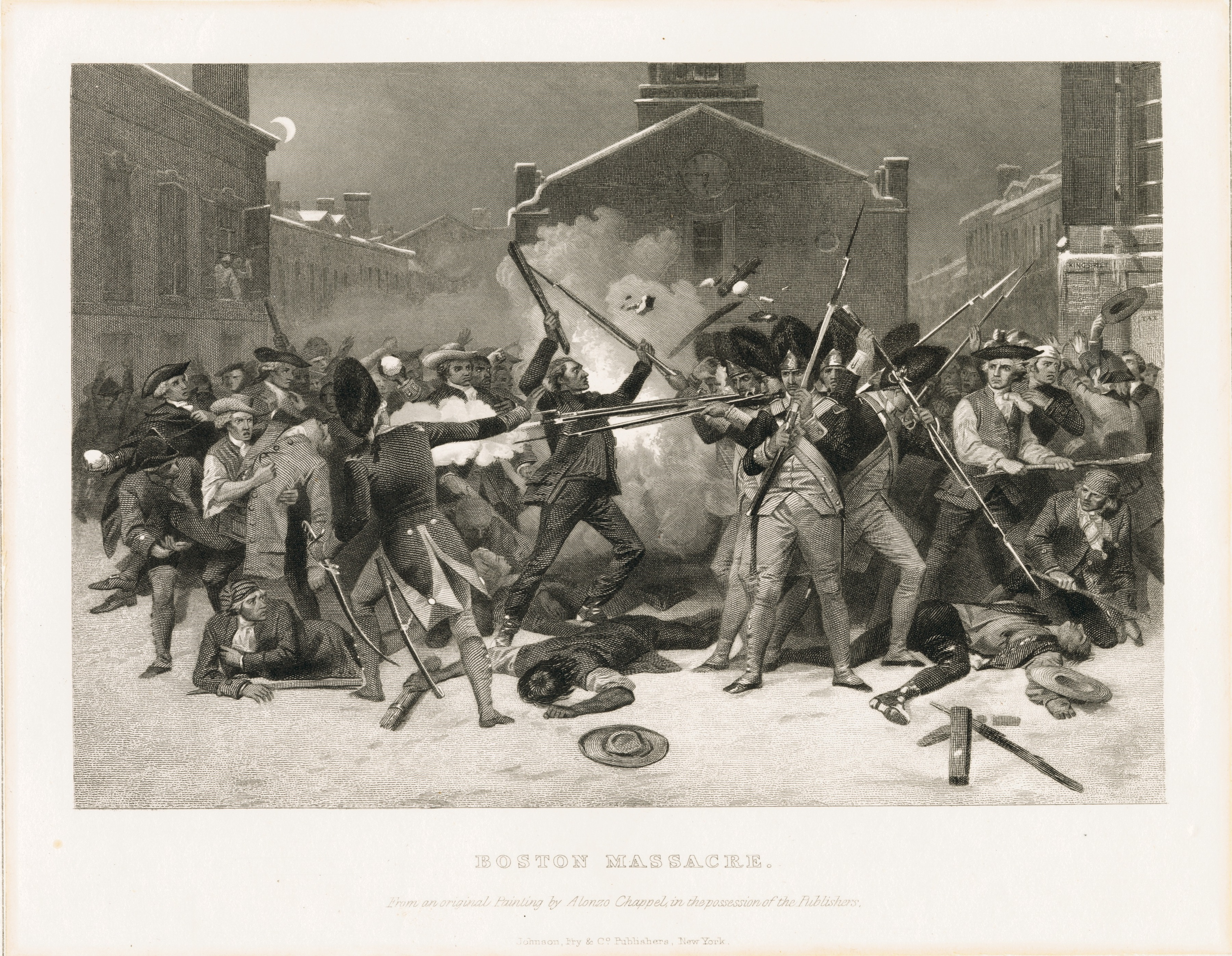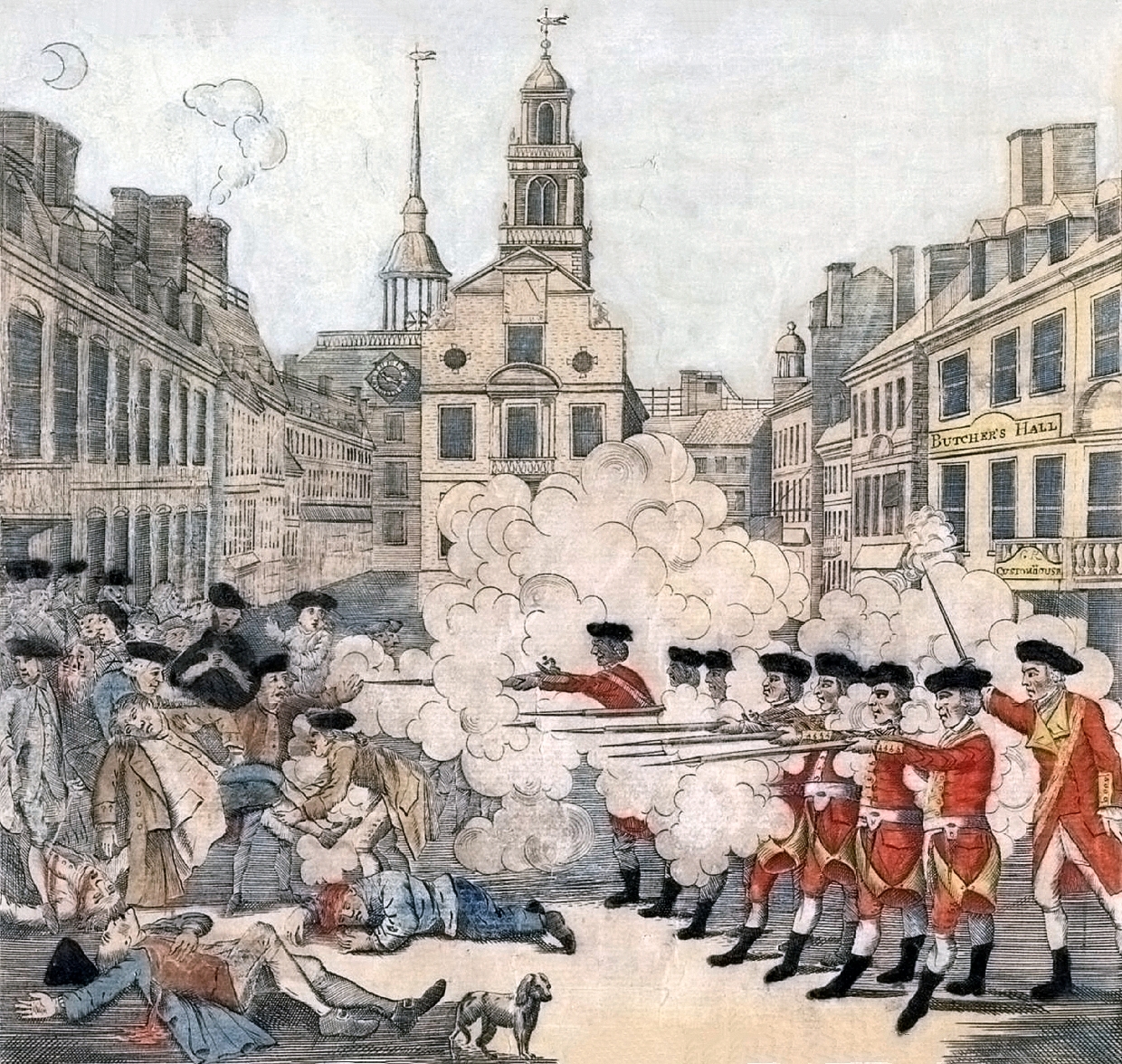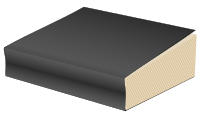Painting by Alonzo Chappel, 1877

Event Summary: March 5, 1770
For a student-friendly summary, see The Boston Massacre from America' Story, Library of Congress
The Boston Massacre from the Massachusetts Historical Society.
See also 1770: Violence--Pause from America in Class, National Humanities Center
 Boston Massacre from YouTube
Boston Massacre from YouTube
Paul Revere's Engraving

Paul Revere's engraving to the right is not an accurate depiction of the event (it did not occur in close quarters, nor with the British commander behind his troops) and is thought to be plagiarized from a drawing by artist Henry Pelham.
- One Black man, named Crispus Attucks, and 4 other laborers who died that day.
For more see Paul Revere's Engraving of the Boston Massacre, 1770
This is an interactive article about the engraving Paul Revere made of the Boston Massacre in 1770. The article explains in details what happened during and after the Boston Massacre.
- Additionally, viewers can zoom in on various parts of the engraving and explains what the imagery is depicting.
Crispus Attucks
Click here for background on Crispus Attucks, a Black man who became the first casualty of the American Revolution.
Cross-Link: Battles and Roles of African Americans during the American Revolution
 Primary Sources
Primary Sources
Captain Preston's Account of the Boston Massacre, March 5, 1770
Multiple Primary Sources on the Massacre
Trial of the British Soldiers
Future President John Adams Defended the British Soldiers

 Boston Massacre Trial, 1770 from Famous American Trials, University of Missouri Kansas City
Boston Massacre Trial, 1770 from Famous American Trials, University of Missouri Kansas City
Adams' Argument for the Defense (December 1770)
 New Perspectives from Historians
New Perspectives from Historians
Reviewing the Boston Massacre, Historian Richard Archer (As If an Enemy's Country: The British Occupation of Boston and the Origins of Revolution, Oxford University Press, 2010) concludes "the evidence strongly suggests that the massacre was a legitimate murder case. The event was not premeditated, since none of the soldiers could have planned on being ordered to quell a crowd that evening. But it gave them an opportunity, and once that first shot had exploded, it is highly likely that at least some of the grenadiers aimed and fired at specific people in the crowd."
- The lessons for modern times is clear, according to Archer, "an occupying force in a strange land, asked to police a suspicious and resentful population can themselves become enraged. Faced with enough indignities and violence, they too can become the agents of mayhem."
Source: "The Charge is Murder," Boston Sunday Globe, April 18, 2010, p. C3.
Reviewing the Boston Massacre, historian Serena Zabin (The Boston Massacre: A Family History, Houghton Mifflin, 2020) found that the event was an occasion of neighbors facing off against neighbors.
- She explored church records and other sources and found dozens of intermarriages between local women and British soldiers. Participants regularly interacted with one another, not only as family members, but members of the community. It was a deadly confrontation between familiar faces. Source: "Familiar Faces, deadly confrontation," The Boston Globe, March 5, 2020.
 Learning Plans
Learning Plans
Boston Massacre Lesson Plan from Colonial Williamsburg.
Boston Massacre: You Be the Judge! from George Mason University
Boston Massacre from Gilder Lehrman Institute of American History
Comments (0)
You don't have permission to comment on this page.